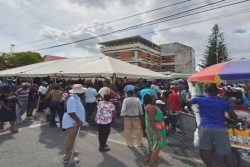On New Year’s day, the American television investigative journalism programme 60 Minutes dedicated a quarter of its weekly episode to the sale of passports by various cash-strapped territories within Caricom, highlighting the potential for possible security risks for the region.
Antigua and Barbuda, Dominica, Grenada, St Lucia and St Christopher-Nevis (St Kitts) offer a programme of Citizenship by Investment (CIP) in real estate or a donation to the territories’ coffers with little or no requirement for residency in exchange for the island’s passport.
The scheme dates back as far as 1984, as the collapse of the St Kitts sugar industry forced its leaders to look for alternative sources of desperately needed income. In 2014, 40% of St Kitts’ revenue came from the sale of passports. As worldwide recession ripple effects struck the region via declining tourism numbers coupled with the long term effects of natural disasters, other islands joined (or are thinking about doing so) the queue advertising passports for sale.
The programme is not unique to the Caribbean; in fact the USA, England, Malta, Austria and Cyprus are among several countries that offer the investment opportunity. The aforementioned countries however have very stringent requirements in place, including compulsory residency and a hefty price tag. For instance, the cost of a much sought after Maltese passport is US$1.57M plus fees, about US$1.85 M in total, and the new passport holder is required to “spend a reasonable amount of time” there, on an annual basis. The new Maltese passport holder then has access to visa-free travel to 166 countries including the USA and Switzerland, and can live and work anywhere in the European Union.
At the other end of the scale, the bargain department, are the five Caricom territories with the cheapest options in the world, ranging from US$250,000 – St Kitts, US$200,000 – Antigua and Barbuda and Grenada, US$100,000 – Dominca, and as of the first of January this year, St Lucia.
The last mentioned presents an interesting case study of this scenario. On the assumption of office in 2011, the St Lucia Labour Party (SLP) was aware that their predecessors, the United Workers Party (UWP) had begun examining the idea of introducing the CIP, but despite the severe economic situation, held off from introducing the programme until 2015.
The SLP claims to have spent a lot of time examining the industry, noting the challenges and the concerns of the populace, including that only reputable and high worth individuals were to be granted citizenship, the establishment of a due diligence framework to ensure unworthy persons were excluded, and of course, every citizen’s priority, there would be accountability and transparency.
The SLP’s objective was to create a CIP aimed primarily at attracting foreign investment in high end hotel and real estate products, and employment generating businesses, and as such the option would be limited to 500 applications annually of individuals with a minimum net worth of US$3M. Accountability and transparency were paramount, an annual report was to be submitted to Parliament listing the names of those granted Saint Lucian citizenship, how much income was collected and how the revenue was spent.
In June 2016, the UWP replaced the SLP in office, and by the start of this year the qualifications for the CIP had been drastically modified. Persons can now make a donation of US$100,000 and no longer have to provide a police certificate from their country of origin or a banker’s reference, to acquire a St Lucian passport. Is this the tip of the iceberg that is about to melt?
Dominican Parliamentarian Lennox Linton admitted to 60 Minutes’ Steve Kroft that “You don’t have to come to Dominica to get the citizenship. You can pay the money from wherever you are”. Linton responded in the affirmative when Kroft prompted that it was mail order citizenship. As Chris Kalin of Henley and Partners, the Swiss-based firm that invented the business model, told Kroft, “but, you know, as it is, advisers advise, ministers decide”.
The purchasers range from newly minted Chinese entrepreneurs, wealthy Russians, Middle East businessmen, citizens of former Soviet Republics and Africa fleeing wars and US investors trying to escape Uncle Sam’s ever widening tax net. Of course, with such a diverse cross section of applicants a pandora’s box of questions is opened up, from the obvious to the ridiculous.
Who does the vetting of applicants? Are the same standards being applied by all the Caricom countries? Is there is an eventual limit to this programme? Can Dominica with a population of 71,000 be eventually outnumbered by non-resident passport holders, who can decide to a form a political party and vote themselves into power? For the moment, let’s restrict our concerns to security.
Is the Trinidad based Caricom institution, the Implementation Agency for Crime and Security (IMPACS) compiling a database of all the passports issued by these countries? Which begs the question, do these territories have a database of all the passports issued? Antigua and Barbuda require applicants to show up in Antigua and spend at least one week a year for the first five years. What about the other four? The list becomes longer and more worrisome.
Uncle Sam keeps a close eye on the money laundering aspect through the banking system, but what about terrorism? Are Caribbean passports being exploited for terrorist activities elsewhere in the world, or could they facilitate the establishment of cells within the region?
President David Granger is the current Chairman of the Heads’ of Government of Caricom, and perhaps the Brigadier General will raise the subject at the next meeting.




